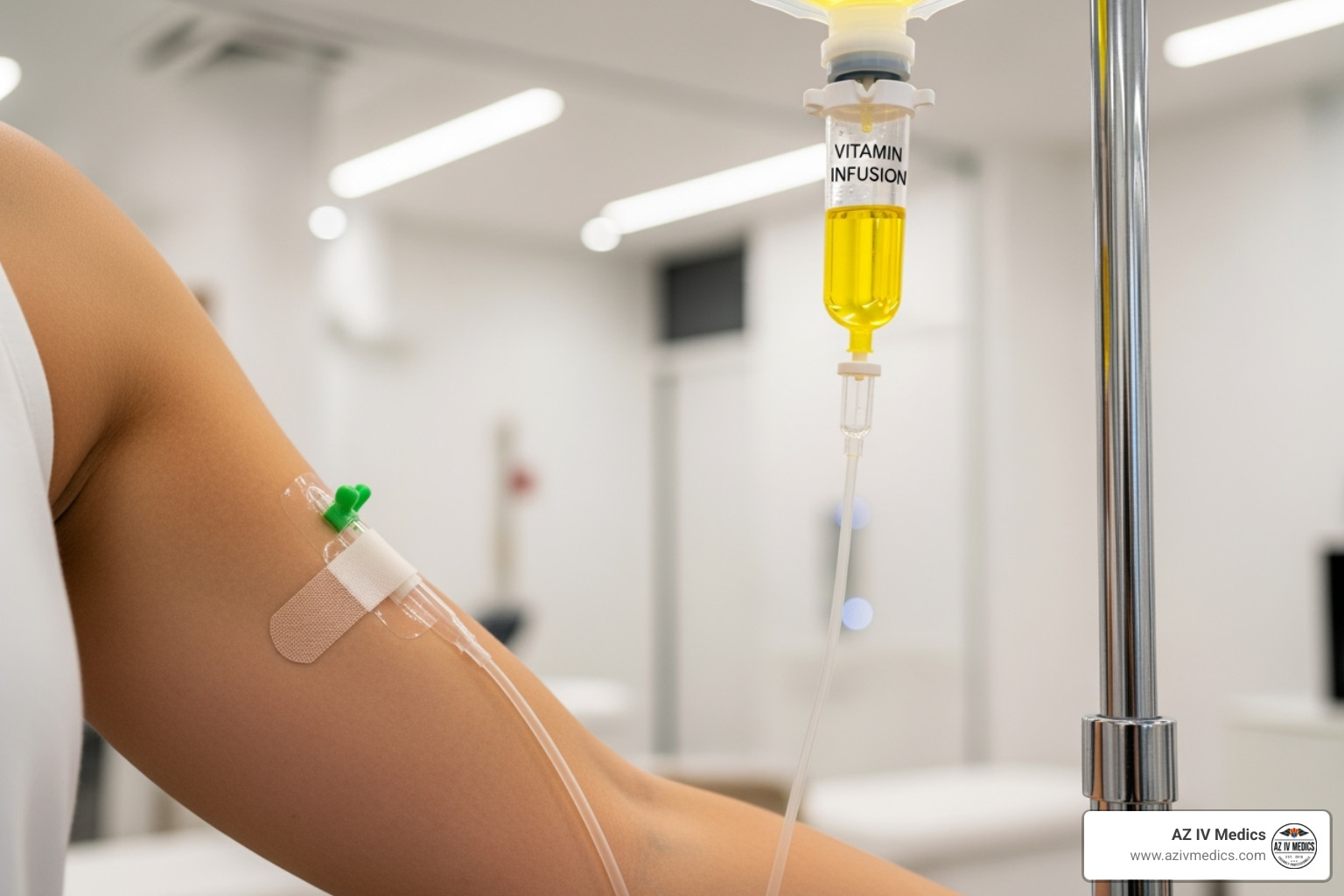How Long Does It Take to Get Drunk? Safe Drinking Tips Explained
August 9, 2022

Our pre-game hydration IV will help you stay hydrated before you drink.
Alcohol affects your body in different ways.
Drinking too much alcohol will make you overindulge. Knowing how much alcohol you need to get drunk will help you avoid that.
An overview of alcohol use and personal health is provided in this article.
How Fast Can You Feel the Results of Alcohol?
The effect of alcohol is not felt instantly; the body gradually absorbs it and creates an exciting feeling within minutes, depending on your tolerance level and other factors.
These factors include:
- Genetics, your gender, and your medical condition.
- Consuming alcohol or using other substances when you have an empty stomach.
- There are some drinks with a higher percentage of alcohol than others. For example, a can of beer contains less alcohol than a vodka shot.
When drinking moderately, you'll feel the effects of alcohol within 30 minutes.
When your body reacts to alcohol, you may experience the following symptoms:
- Increasing social interaction
- A lack of coordination
- Euphoric
- Feeling less inhibited
- Feeling fatigued or tired.
Summary
Drinking more than a glass every thirty minutes means you're drinking too fast and too much. It takes your body an hour to metabolize a drink, but the intoxicating effect starts within 30 to 35 minutes.
Alcohol Consumption: Male vs. Female
Compared to men, women metabolize alcohol differently because they have more fat and less water weight. As a result, women are more likely to get tipsy and experience more intoxicating effects than men.
When the first intoxicating effect kicks in, women absorb more alcohol into their bloodstream. The faster your body absorbs alcohol into your blood, the faster it creates intoxication.
There are a few reasons why women metabolize alcohol more quickly than men.
Hormone differences
The brain responds better to alcohol when there is a high level of estrogen present. Women have a higher estrogen level than men, so they feel the effects of alcohol faster than men.
Digestive enzyme differences
The amount of dehydrogenase in men is higher than that in women. On a medium scale, women have half as much dehydrogenase as men.
Height and weight differences
Alcohol is metabolized slowly by people who are overweight or taller than average. Men often weigh more and are taller than average women.
Alcohol and Weight
Depending on how much alcohol you have in your bloodstream, alcohol affects your nervous system.
If you have enough water in your bloodstream, alcohol dilutes a little faster because it's distributed by plasma (the water content of the blood).
If a person of small stature drinks the same volume of alcohol as someone of bigger size, they will have a higher percentage of water and blood.
After taking three to four shots, most people become intoxicated; the process can be accelerated if the person is small.
Tolerance Levels
Alcohol's effect is influenced by tolerance; the more alcohol you consume, the less your body responds to it.
People who aren't used to drinking alcohol are more sensitive to its effects.
People whose families have liver diseases are more likely to contract the disease themselves if they drink heavily.
Alcohol and Medication
Whether it's an over-the-counter or prescription drug, alcohol always has the potential to interact with medications. This is why it's essential to consult your health care provider before taking any medication.
Alcohol may interact with some over-the-counter and prescription drugs, such as:
- Cold and flu Medications like Sudafed, Benadryl, and Tylenol
- Depression and anxiety Drugs like Klonopin, Ativan, Paxil, and Valium.
- Antibiotics like Zithromax and Flagyl
- Antipsychotic drugs like Risperdal and Seroquel
- Diabetes drugs like Orinase and Glucotrol
- Indigestion and heartburn medication like Zantac and Reglan
- Pain killers like Naprosyn and Celebrex.
- Sleep medications like Lunesta, Ambien, and Unisom
An alcohol and drug interaction can cause nausea, dizziness, and even life-threatening symptoms like breathing problems or increased blood pressure.
If you notice any of these symptoms, you should seek the advice of a professional immediately. Mixing drugs with alcohol intensifies the dose and exposes you to the threat of overdosing.
Alcohol and Drugs
It's not advisable to get street drugs. However, they can also mix with your alcohol. Alcohol can intensify the effects of lots of street drugs, which can be deadly. Mixing your drugs can lead to an overdose.
The most lethal drugs are opioids and cocaine. Opioids slow down breathing, and when mixed with alcohol, they can cause you to stop breathing.
Cocaine and alcohol in the liver form cocaethylene, which increases the effects and puts you at risk for sudden death.
A combination of alcohol and street drugs intensifies their intoxicant effects, which can cause irreversible harm to the body or result in death. These drugs include:
- Heroin
- Cocaine
- Meth
- Kratom
- Fentanyl
- MDMA
- Mushrooms
- Molly
When combined with alcohol, they can cause organ failure, organ damage, or even death. We recommend seeking professional treatment if you suffer from any of these addictions. We have IV therapy to help with detox if you’re ready to take that step.
Summary
When alcohol is used with medications/drugs, the effects will be intensified, resulting in difficulties concentrating and performing mechanical tasks.
How Long Does Alcohol Take to Kick in on an Empty Stomach?
Most of the alcohol is absorbed by the stomach and small intestines. Therefore, if you have an empty stomach, alcohol can affect you faster. If you have eaten before drinking, alcohol can affect you more slowly.
A full belly means it takes longer for the alcohol to be absorbed. If you drink on an empty stomach, it will intensify hangover symptoms, such as:
- Dehydration
- Trouble thinking
- Vertigo
- Migraines
- Mood changes
- Nausea and vomiting
Drinking enough fluids, resting, or eating light foods such as crackers can alleviate any of these symptoms.
The Risks of Drinking on an Empty Stomach
When you drink on an empty stomach, you put yourself at risk for health problems. You can experience alcohol poisoning, which can lead to coma and brain damage.
- Mental instability
- Loss of consciousness
- Slow breathing
- Trouble moving or speaking
We strongly recommend you seek medical attention if you observe any of the above symptoms. Alcohol poisoning can cause irreversible organ damage.
How Long Does it Take for Alcohol to Affect the Brain?
It is common knowledge that drinking is associated with pleasure and reward, but other factors can also contribute to addiction. People often become addicted to alcohol as a means of dealing with stress.
Alcohol gradually adjusts the body to the changes caused by hormones that influence our stress and reward systems.
The effects of alcohol are felt within ten minutes after they are absorbed through the stomach and then enter the bloodstream.
When alcohol is misused excessively, permanent brain damage can result. In severe cases, the brain can be permanently damaged due to damage to the white matter fibers that connect the various parts of the brain. This can interfere with the connection and function of several parts of the brain.
Dementia can result from brain damage, a condition called Korsakoff's syndrome. Korsakoff's syndrome is characterized by an excess of alcohol stored in the body, preventing it from synthesizing the proper amounts of thiamine (Vitamin B1). The following symptoms characterize it:
- Having difficulty recalling information from short-term memory
- Gaps in long-term memory
- Having difficulty learning new information
- Hallucinations
If you have been diagnosed with Korsakoff syndrome, we strongly recommend abstaining from alcohol completely. Eating healthy and taking thiamine supplements can also improve your recovery.
The brain receives alcohol in five minutes; the intoxicating effect starts in ten minutes. The liver begins to process alcohol in twenty minutes.
How Long Does It Take to Get Sober?
In general, a standard drink takes the body an hour to metabolize. However, your tolerance level plays a much larger role. If you consume too much alcohol in a short period, you will take longer to sober up.
The level of alcohol in your bloodstream will also influence how long it takes for drinks to remain in your body. Alcohol is expelled into the bloodstream at 3.3 millimoles per hour.
- Three hours for a large glass of wine
- Two hours for a pint of beer
- One hour for a small shot of liquor
A liquor shot wears off in one hour, a pint of beer lasts for two hours, and a large glass of wine lasts for three or four hours. There are many factors that can affect how long alcohol stays in your body.
- Gender and age
- Drugs or medications you are taking.
- Body weight
- When you drink on an empty stomach
- The quality and pace of your alcohol consumption
Within an hour or two, you can expel the intoxicating effects of alcohol by following these steps:
- Eating food
- Avoiding the use of caffeine
- Drinking enough water
- Limiting your shots to one glass per hour
While alcohol's intoxicating effects last only a few hours, your body retains its trace for several months. Hair tests are able to detect alcohol up to three months after use.
IV Therapy to Help With Hangovers
Within a half hour to an hour, IV therapy combats hangover symptoms. It helps you rehydrate while flushing toxins out of your system and restoring all the nutrients you have lost.
Using IV therapy, you can rehydrate your body within minutes and alleviate the most severe hangover symptoms.
Please click on the following links to find out where we offer IV therapy:
IV Therapy in Texas
Hangover Symptoms
This effective intravenous treatment can relieve different hangover symptoms directly from their source. Our Hangover IV Drip can be used to address these symptoms:
- Muscle aches and headaches
- Weakness and fatigue
- Nausea and vomiting
- Irritable mood
- The dizzy feeling from dehydration
Conclusion
Knowing your limit and respecting your body's needs regarding alcohol is important. The response of your body to alcohol depends on several factors. Some of these factors are under your control while others are not.
When drinking too much alcohol, you will only flood your bloodstream and make it hard for you to control your condition. Drinking safely and moderately can reduce the risk of health issues associated with drinking.
We recommend drinking moderately and safely to reduce your risk of alcohol-related health problems in the long run. Taking excessive alcohol will cause organ damage in the long run; therefore, we recommend you drink responsibly.




